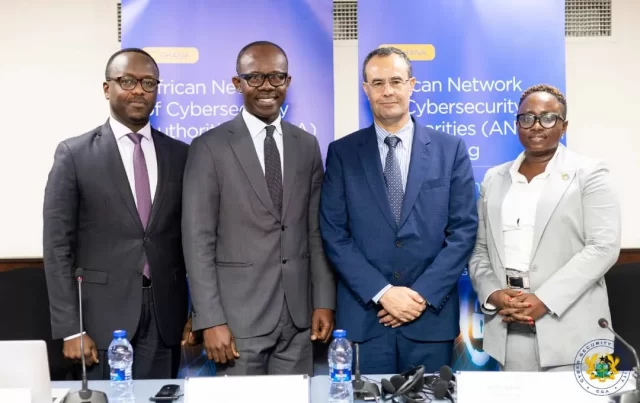By Yayra Lawoe
The Cyber Security Authority (CSA) has been elected to lead the African Network of Cybersecurity Authorities (ANCA), a body established by Smart Africa to improve cybersecurity coordination across the African continent.
The election took place at the 2nd meeting held on Tuesday, November 28, 2023, in Accra on the margins of the Global Conference on Cyber Capacity Building (GC3B).
Ghana will Chair this Network with the Kingdom of Morocco being confirmed as the Vice Chair. The position of the Chairperson, Vice Chairperson, and Smart Africa Secretariat will constitute the Bureau of the ANCA, which will be responsible for the governance structure of ANCA, the body’s action plan, and advocate and represent the interests of the members.
Ghana’s election to lead this body is a further manifestation of Ghana’s growing leadership on the continent with respect to cybersecurity matters.
The Director-General of the Cyber Security Authority, Dr Albert Antwi-Boasiako who will now serve as the Chair of the Network outlined Ghana’s vision for ANCA which includes providing leadership on cybersecurity matters on the African continent.
Priorities outlined by the inaugural Chair of the Network, include the establishment of the governance structure for the network for effective engagements, growing the membership of the network from the current number of 17 countries, setting up a platform for operational exchanges and practical cooperation among members, exploring funding models and partnerships for cybersecurity development in member countries and across the continent.
He also mentioned contributing to Smart Africa’s flagship initiatives as the continental advisory body on cybersecurity matters as well as articulating Africa’s voice on cybersecurity matters in global discussions, among others.
The African Network of Cybersecurity Authorities (ANCA) comprises a number of African cybersecurity authorities and agencies from different geographical and linguistic areas, with the aim of setting up a platform for exchanges and cooperation between its members and making Africa’s voice heard in its dealings with partners around the world on cybersecurity matters.
ANCA currently comprises only 17 members representing African countries that have established dedicated National Cybersecurity Authorities. The countries include Benin, Burkina Faso, Cameroon, Chad, Congo Republic, Djibouti, Gabon, Ghana, Guinea, Kenya, Morocco, Mozambique, Rwanda, Senegal, Sierra Leone, Togo and Tunisia.
On November 29, Ghana hosted over 800 delegates from over 100 countries across the globe who participated in the first-ever Global Conference on Cyber Capacity Building (GC3B). The two-day event themed “Cyber Resilience for Development” was organised by the Cyber Security Authority, Global Forum on Cyber Expertise (GFCE), the Cyber Peace Institute, the World Bank, and the World Economic Forum and was hosted by the government of Ghana, through the Ministry of Communications & Digitalisation.
The Conference brought together a diverse group of high-level decision-makers and practitioners from Governments, international organisations, the private sector, civil society, and academia. A major highlight of the conference was the outdooring of the Accra Call for Cyber Resilient Development by the organisers with more than 40 institutions endorsing the document at the end of the two-day event.
Ghana’s significant progress in cybersecurity development is evidenced in its current ITU ranking. The 2020 Global Cybersecurity Index (GCI) report of the International Telecommunications Union (ITU) scored Ghana’s cybersecurity development 86.69% on the metric showing major progress from a rating of 32.6% in 2017.
The score placed Ghana 3rd in Africa behind Mauritius and Tanzania, a major leap from the 10th
place attained in 2017. Globally, Ghana moved from the 86th position in 2017 to 43rd place.
The SMART Africa initiative is a commitment made by African Heads of State and Government to promote sustainable socio-economic development on the continent. It aims to transform Africa into a knowledge economy by providing affordable access to broadband and utilising Information and Communication Technologies. The initiative was launched at the Transform Africa Summit in 2013, where seven African countries adopted the Smart Africa Manifesto.
The initiative is based on five pillars, including policy, access, e-government, private sector/entrepreneurship, and sustainable development. The ultimate goal of the Smart Africa Manifesto is to promote economic growth and job creation in Africa.









![Fuse ODG violently handcuffed, dragged out of his car by UK Police over alleged ‘Wee’ smell [Video]](https://ghananewss.com/storage/2023/05/Fuse-ODG-hand-100x75.jpeg)








